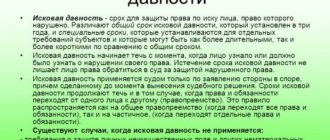Cheat time: how to restart the statute of limitations
– Forgetfulness, inattention, ignorance.
- They believed the promises. Often, participants in relationships do not enter into a conflict until the last minute, relying on the counterparty’s assurances that he will soon solve his problems, says partner INTELLECT INTELLECT Federal Rating. group Digital economy group Intellectual property (including disputes) TMT group (telecommunications, media and technology) 13th place By number of lawyers 25th place By revenue per lawyer (more than 30 lawyers) 36th place By revenue Company profile Alexander Latyev. But you cannot present a promise in court. For example, if they were given over the phone or in person, he warns. Often, companies ignore the rules of claims work in relations with affiliates or simply due to trust relationships, notes Sotheby's Federal Rating partner. group Bankruptcy (including disputes) group Private wealth management group Arbitration proceedings (major disputes - high market) Company profile Anton Krasnikov.
– Internal bureaucracy. First there are lengthy attempts to resolve the dispute peacefully, says Pepelyaev Group partner Pepelyaev Group Federal Rating. group Foreign trade activities/Customs law and currency regulation group Tax consulting and disputes (Tax consulting) group Tax consulting and disputes (Tax disputes) group Labor and migration law (including disputes) group Digital economy group Antimonopoly law (including disputes) group Land law/Commercial real estate/Construction group Intellectual property (including disputes) group Compliance group Natural resources/Energy group Pharmaceuticals and healthcare group Environmental law group Bankruptcy (including disputes) group Corporate law/Mergers and acquisitions group Family and inheritance law TMT group (telecommunications, media and technology ) group Financial/Banking Law group Arbitration proceedings (major disputes - high market) group Dispute resolution in courts of general jurisdiction Yuri Vorobyov. Then, he continues, you need to get an administrative decision to go to court (including the allocation of a budget), after which the stage of “procurement” of legal services begins.
– Huge number of potential lawsuits. This is often found in the practice of credit, insurance organizations, and bankruptcy trustees, says Dentons Dentons Federal Rating Advisor. group Antitrust law (including disputes) group Land law/Commercial real estate/Construction group Intellectual property (including disputes) group Compliance group Corporate law/Mergers and acquisitions group International litigation group Tax consulting and disputes (Tax consulting) group Tax consulting and disputes ( Tax disputes) group Capital markets group Labor and migration law (including disputes) group Pharmaceuticals and healthcare group Financial/Banking law group Digital economy group Arbitration proceedings (medium and small disputes - mid market) group Foreign trade activities/Customs law and currency regulation PPP group/ Infrastructure projects group International Arbitration group Natural Resources/Energy group Dispute resolution in courts of general jurisdiction TMT group (telecommunications, media and technology) group Transport law group Private wealth management group Bankruptcy (including disputes) 2nd place By the number of lawyers Maria Mikheenkova. According to her, due to the large volume of work, claims are often filed literally on the last day of the deadline, and if a mistake is made with the identity of the defendant, then when a subsequent replacement is made, the deadline will be considered expired.
– There is no interaction between accountants and the legal department. After all, most often it is from them that lawyers receive information about debts, Krasnikov notes.
– Lost documents that confirm the debt (deferred payment agreements, receipts, etc.). This is a common reason cited by Alina Khammatova from S&K Vertical S&K Vertical Federal Rating. group Family and inheritance law group Private wealth management group Arbitration proceedings (major disputes - high market) group Bankruptcy (including disputes) group Corporate law/Mergers and acquisitions 18th place By revenue 25-27th place By number of lawyers 6th place By revenue per lawyer (more than 30 lawyers ) . This is typical for bankruptcies, where documents can take a long time to be transferred, and some may simply be missing, Krasnikov adds.
– The statute of limitations was incorrectly determined. It can be general (three years) or special (for example, one year in relation to contracts of carriage).
– Incorrectly determined the beginning of the limitation period. This is not always obvious, which is why errors occur, says Infralex partner Infralex Federal Rating. group Antimonopoly law (including disputes) group Arbitration proceedings (medium and small disputes - mid market) group Bankruptcy (including disputes) group PPP/Infrastructure projects group Land law/Commercial real estate/Construction group Digital economy group Corporate law/Mergers and acquisitions group Tax consulting and disputes (Tax disputes) group Family and inheritance law group Tax consulting and disputes (Tax consulting) group Criminal law Company profile Yulia Karpova. As an example, she cites lawsuits aimed at challenging a registered right. “Here, the limitation period begins to run not from the day when an entry was made in the Unified State Register, but from the day when the person learned or should have learned about such an entry,” Karpov quotes paragraph 57 of the joint Resolution of the Plenum of the Supreme Arbitration Court and the Supreme Court No. 22 dated April 29, 2010. And sometimes it happens that a party is sincerely mistaken about the start of the term, shares the head of the property and liability relations practice of the National Legal Service AMULEX National Legal Service AMULEX Federal rating. Galina Hamburg. The wording from clause 1 of Art. 200 of the Civil Code (when he learned or should have learned about a violation of the right and who should be the proper defendant) allows, to a certain extent, to “play” with deadlines, says Hamburg. “The plaintiff finds out that his right was violated, and the defendant counters that the plaintiff should have known about it much earlier,” she shares.
Subtleties of the limitation period that are important for the representative of the plaintiff or defendant to know
The second lecture by the editor of the journal of the Russian School of Private Law, professor and director of the Center for Comparative Law of the National Research University Higher School of Economics, arbitrator of the ICAC, Arbitration Center at the RSPP Andrey Egorov at the FPA webinar on May 6 was devoted to the topic “Limitation of claims: subtleties that are important for the representative of the plaintiff to know or the defendant."
At the beginning of the lecture, reports the FPA press service, Andrei Egorov recalled the main regulations that explain the provisions of the Civil Code of the Russian Federation on the limitation period. This issue was specified with amendments to subsection. 4 and 5 sections I part 1 and art. 1153 part 3 of the Civil Code of the Russian Federation in 2013
Also on September 29, 2015, the Plenum of the Supreme Court of the Russian Federation adopted Resolution No. 43 “On some issues related to the application of the provisions of the Civil Code of the Russian Federation on the limitation period.” This document consistently continues to explain the provisions of the updated Civil Code of the Russian Federation, which gives reason to once again comprehend the innovations in relation to the limitation period, as well as evaluate how such innovations are interpreted by the Plenum.
The clarifications of the highest court on the limitation period were initially proposed to be included in the Resolution of the Plenum of the Supreme Court of the Russian Federation dated June 23, 2015 No. 25 “On the application by courts of certain provisions of Section I of Part 1 of the Civil Code of the Russian Federation”, but already in the process of work it was decided to separate them into a separate document. It is also interesting to compare the newly adopted resolution with the previously valid act of interpretation - the joint Resolution of the Plenum of the Supreme Arbitration Court of the Russian Federation dated November 12, 2001 No. 15, the Plenum of the Supreme Arbitration Court of the Russian Federation dated November 15, 2001 No. 18. The previous resolution no longer applies. Therefore, it is important to understand in what part the new document retains continuity with the previous act, and which provisions of Resolution No. 15/18 and for what reasons were not accepted.
The problem of limitation of actions is one of the most complex in civil law. This is expressed, in particular, in the fact that the current version provides for a significant number of different limitation periods - both subjective and objective.
As Andrey Egorov noted, it is necessary to establish which claims are subject to the statute of limitations. First of all, the exception should concern claims for recognition. Such claims occur in relation to invalid transactions. Here it is necessary to distinguish between voidable and void transactions. When demanding to recognize a void transaction as invalid, there should be no limitation period. Courts often do not actually apply the limitation period when considering such cases, although it would seem that the Civil Code speaks about it. And this is correct, since there are issues that need to be resolved regardless of how many years have passed since her conclusion.
In his opinion, contrary to the provisions of the Family Code, limitation cannot be applied in a claim for the division of marital property, since the spouses remain co-owners of jointly acquired property. The property ownership of an asset cannot be limited by the statute of limitations. The statute of limitations is possible only for claims for award (claims). But even among claims, not all are subject to limitation. For example, there is no statute of limitations for a negative claim. True, there may be disputes when the claim is negative, and when it is vindication, for example, when a seizure (intentional or accidental) of a small part of a neighbor’s land occurs.
Having dwelled on the issue of calculating the limitation period (both objective and subjective), the expert noted that the limitation period, as a rule, begins from the day when the person learned or should have learned about the violation of his right and who is responsible defendant in a claim to protect this right. It is interesting that if in the previous wording of paragraph 1 of Art. 200 of the Civil Code of the Russian Federation for these purposes required actual or imputed knowledge of a person only about the violation of his right, but now it is also necessary to know about the person who violated (violates) such a right.
The lecturer drew attention to the fact that from September 1, 2023, questions about the objective period will become truly relevant, since 10 years will expire from the date of amendment to the Civil Code of the Russian Federation. Until this moment, the objective statute of limitations does not work, since it only applies to claims that arose after September 1, 2013. And in the subjective period, the most important thing is the moment when a person learned or supposedly should have learned about the violated right. At the same time, this phrase “should have known” is better interpreted as “could not help but find out” or “did not find out due to gross negligence.”
For obligations with a specific performance period, the limitation period begins to run upon the expiration of the performance period. And for obligations for which the deadline for fulfillment is not determined or is determined by the moment of demand, the limitation period begins to run from the day the creditor presents a demand for fulfillment of the obligation, and if the debtor is given a period for fulfilling such a requirement, the calculation of the limitation period begins at the end of the period provided for fulfillment such a requirement. In this case, the limitation period, in any case, cannot exceed 10 years from the date the obligation arose.
There is a tendency to increase the statute of limitations, noted Andrey Egorov. It is possible to delay the start of such a period or to suspend it. The first option is possible, for example, if the court does not like that the plaintiff missed the statute of limitations. Sympathizing with the plaintiff and wanting to protect his interests, the court may extend the start of this period. The second is possible due to a number of circumstances, such as an emergency and unpreventable circumstance under the given conditions (force majeure), the presence of the plaintiff or defendant in the Armed Forces of the Russian Federation, transferred to martial law, due to the established deferment of the fulfillment of obligations or suspension of the legal act regulating the relevant attitude .
The lecturer warned that the limitation period ceases to run if the claim is brought in court or if the debt is recognized by the defendant. From the date of application to the court in the prescribed manner for the protection of a violated right, the statute of limitations does not run for the entire time that the judicial protection of the violated right is carried out. As for the recognition of debt, according to the expert, there is a tendency for a restrictive interpretation of such cases in judicial practice, which is sometimes unjustified.
Regarding who exactly can declare in court that the statute of limitations has passed, Andrei Egorov believes that the Supreme Court was in vain to grant such a right to a third party. This and other examples indicate that acts of interpretation of the law also sometimes require interpretation or clarification.
At the end of the lecture, a few words were said about the statute of limitations for corporate and indirect claims. The expert, as a rule, supported his conclusions with specific and very clear examples, which made it possible to evaluate certain court decisions in which the protection of rights was denied due to the application of the statute of limitations.
The accompanying materials for the lecture can be found here.
The broadcast will be repeated on Monday, May 11.
Article 199 of the Civil Code of the Russian Federation. Application of the limitation period (current version)
1. According to paragraph 1 of the commented article, the court is obliged to accept for consideration the claim for the protection of a violated right, regardless of the expiration of the limitation period. In theory, this rule is called the “right of action in the procedural sense.”
The existence of such a rule is due to the fact that a formally missed limitation period can be restored by the court (see commentary to Article 205).
2. According to paragraph 2 of the commented article, the limitation period is applied by the court only upon the application of a party to the dispute made before the court makes a decision, and the court does not have the right to take the initiative in this matter.
The imperative significance of this provision of the commented article is manifested even at the stage of preparing the case for trial, since the judge does not have the right to invite the parties to present evidence or give explanations related to the missed statute of limitations.
In paragraph 10 of the Resolution of the Plenum of the Supreme Court of the Russian Federation dated September 29, 2015 N 43 “On some issues related to the application of the norms of the Civil Code of the Russian Federation on the limitation period” (as amended on February 7, 2017) the following is said.
“According to paragraph 2 of Article 199 of the Civil Procedure Code of the Russian Federation, the limitation period applies only at the request of a party to the dispute, which, by virtue of the provisions of Article 56 of the Civil Procedure Code of the Russian Federation, Article 65 of the Arbitration Procedure Code of the Russian Federation, bears the burden of proving circumstances indicating the expiration of the limitation period.”
When considering disputes related to the limitation period, it is necessary to keep in mind that in accordance with paragraph 12 of the Resolution of the Plenum of the Supreme Court of the Russian Federation, the Plenum of the Supreme Arbitration Court of the Russian Federation dated February 28, 1995 N 2/1 “On some issues related to the implementation of part one of the Civil Code of the Russian Federation" "a statement by a party to a dispute on the application of the statute of limitations can be made at any stage of the process before the court of first instance makes a decision. At the same time, the application for the application of the limitation period does not prevent the consideration of the plaintiff-citizen’s application for recognition of a valid reason for missing the limitation period and its restoration, which the court has the right to satisfy if the circumstances specified in Art. 205 Civil Code."
However, it should be taken into account that a statement about the passage of the limitation period coming from a third party does not serve as a basis for the court to apply a limitation period. In paragraph 10 of the Resolution of the Plenum of the Supreme Court of the Russian Federation dated September 29, 2015 N 43 “On some issues related to the application of the norms of the Civil Code of the Russian Federation on the limitation period” (as amended on February 7, 2017) the following is said. “Since the limitation period applies only upon the application of a party to the dispute (clause 2 of Article 199 of the Civil Code of the Russian Federation), a corresponding statement made by a third party, as a general rule, is not a basis for the court to apply a limitation period. At the same time, a statement about the expiration of the limitation period may be made by a third party if, if the claim against the defendant is satisfied, the defendant may file a recourse claim or a claim for damages against the third party.”
Part 2 of paragraph 2 of the commented article states that the expiration of the limitation period, the application of which is declared by a party to the dispute, is the basis for the court to make a decision to reject the claim. This rule is called the “substantive right of action.”
The expiration of the limitation period is an independent basis for refusal of a claim (paragraph two of paragraph 2 of Article 199 of the Civil Code of the Russian Federation). If it is established that a party to the case has missed the limitation period and there are no valid reasons for restoring this period for the plaintiff - an individual, then if there is an application from the appropriate person about the expiration of the limitation period, the court has the right to refuse to satisfy the claim only on these grounds, without research into other circumstances of the case.
3. In paragraph 3 of Art. 199 of the Civil Code directly states the inadmissibility of unilateral actions aimed at suspending or interrupting the limitation period for claims for which the limitation period for the protection has expired. This provision of the law contains an approximate list of such actions, and the legislator includes: set-off, direct write-off of funds, foreclosure of pledged property out of court.
The introduction of this paragraph in the commented article is due to the fact that in practice there have been cases when participants in civil circulation, on claims with an expired statute of limitations, used unilateral extrajudicial actions aimed at exercising the right, examples of which are given in this paragraph. To prevent such cases from happening, the specified ban was introduced.
Thus, this innovation is intended to protect the debtor from actions of the creditor carried out unilaterally out of court in order to interrupt the running of the limitation period.
It should be noted that the Civil Code has a specific norm that contains such a prohibition. However, it is not general. Yes, Art. 411 of the Civil Code (see commentary to it) states that offset of claims is not allowed if, at the request of the other party, the claim is subject to a limitation period and this period has expired.
It should also be noted that if the property was nevertheless transferred in fulfillment of an obligation after the expiration of the statute of limitations, then it is not subject to return as unjust enrichment (Article 1109 of the Civil Code).
Comment source:
“CIVIL CODE OF THE RUSSIAN FEDERATION. PART ONE. ARTICLE-BY-ARTICLE COMMENT"
S.P. Grishaev, T.V. Bogacheva, Yu.P. Sweet, 2019
Supreme Court of the Russian Federation on the limitation period
Colleagues, the article is really good, there are references to international law, which made me very happy, however, an incident happened in my life: the Plaintiff filed a statement of claim in court against my client (Defendant). The court accepted the claim and considered it in a simplified manner, because The defendant changed his place of residence and, on top of everything, was on a business trip. Upon returning from a business trip, he sought legal help. The essence of the claims came from the loan agreement. My client (Defendant) borrowed a certain amount of money, paid the money back on time, and received a receipt from the Plaintiff. The receipt was drawn up on December 23, 2014. The deadline for refunding funds was December 31, 2014. December 21, 2021 The Plaintiff sent a statement of claim to the court through the Russian Post Office. The court accepted the application and considered it in March 2021. made a default judgment to recover funds from the Defendant in full. In April 2021 We applied for cancellation of the default judgment, the decision was canceled. And then we noticed that the statement of claim was initially signed not by the plaintiff himself, but by an unidentified person. The application was not accompanied by a power of attorney for the representative; the name of the Plaintiff is written, but the signature is not his. The limitation period ended on December 31, 2021. and from January 1, 2018 should have been missed. The court of first instance left without consideration the Plaintiff's statement of claim, signed by an unidentified person (Part 4 of Article 222 of the Code of Civil Procedure of the Russian Federation). The next day (May 23, 2021), another representative of the Plaintiff submits a statement of claim to the court in the proper form, attaching a power of attorney and the name of the representative. The defendant makes a statement about missing the limitation period, because The plaintiff missed the deadline by 4 months and 23 days. However, the court excludes from the statute of limitations the period during which the statement of claim was in court from the moment of filing - December 21, 2021. until May 22, 2021 and denies the Defendant the application of Art. 196 of the Civil Code of the Russian Federation. The interests of the Plaintiff were represented in court by a lawyer during the initial and re-examination of the claim. he had a lawyer's warrant and a lawyer's certificate. My question is quite simple. Could improper behavior of the Plaintiff's representative, expressed in filing and signing a statement of claim for the Plaintiff himself (in fact, an abuse of authority), be a circumstance of interruption of the limitation period or a circumstance of interruption of the limitation period? If so, then how can such behavior of the Plaintiff (not empowering his representative), violating the law, entail any legal consequences in the form of suspension of the statute of limitations? In itself, suspension, interruption, or interruption of the limitation period is a tool for the Plaintiff to preserve the possibility of filing a claim in court in the future, without fear that his claim will be rejected on the basis of missing the limitation period. However, what to do with the situation when the Plaintiff (the Plaintiff’s representative or a generally unknown person) intentionally filed a statement of claim with the goal of “what if it goes wrong” and any legal consequences occur in the form of collection of funds, interruption of the statute of limitations, etc. d. When answering the question why we didn’t refer to the receipt, that’s what the Client wanted. He believes that in this case there is a limitation period and we do not have to prove any other circumstances.
What is a statute of limitations?
The statute of limitations is a period established by law during which a person whose rights have been violated may seek judicial protection. Eliminates uncertainty and ensures stability of civil turnover.
For example, if the creditor has not taken any action to collect the debt within a certain time, then at the end of this period the court will refuse to satisfy his claims if there is an application from the debtor to apply the statute of limitations.
What should you do if the statute of limitations has been missed through no fault of yours? Is it possible to restore it? What events suspend the limitation period and what actions of the debtor interrupt it?









